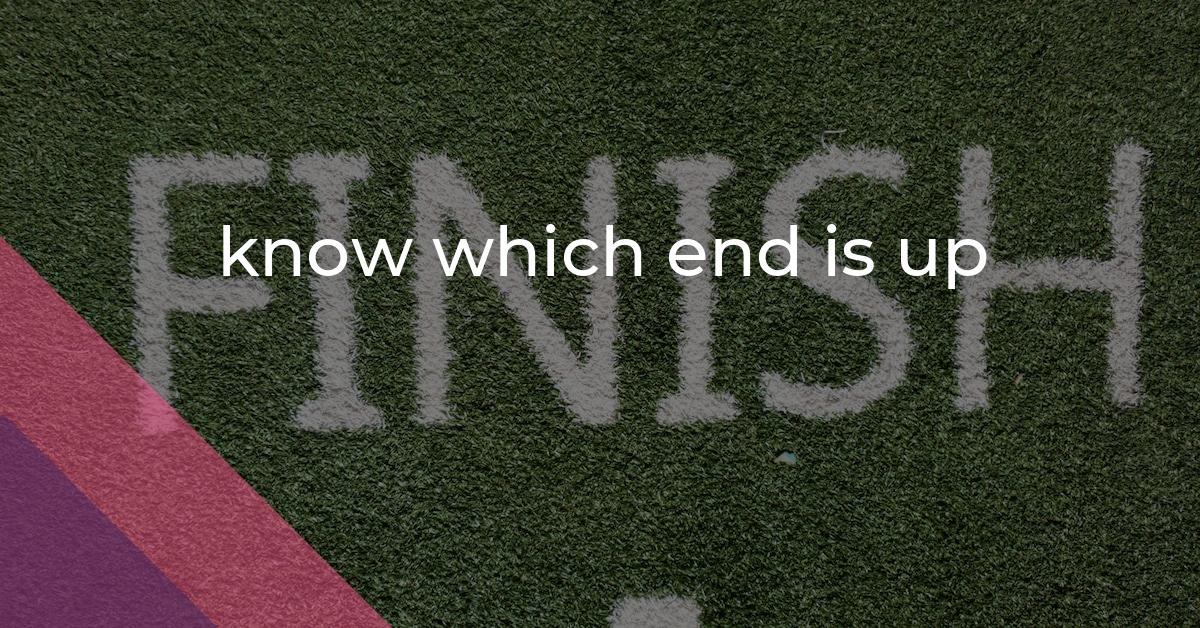know which end is up: Idiom Meaning and Origin
What does ‘know which end is up’ mean?
The idiom "know which end is up" means to have basic knowledge or understanding of a situation or task.

Idiom Explorer
The idiom *know which side one's bread is buttered on* means to understand where one's interests lie and to act accordingly in order to benefit oneself or to avoid negative consequences. It suggests being aware of the people or situations that can provide advantages and acting in a way that maintains or strengthens those advantages.
The idiom "know what is what" means to have a clear understanding or knowledge of a situation or topic. It implies being well-informed and aware of the essential facts or details, allowing one to make informed decisions or judgments.
The idiom "know the score" means to understand and be aware of the situation or the facts.
The idiom "know one's way around" means to be familiar with or knowledgeable about a particular place, task, or subject.
The idiom "know one's shit" means to be very knowledgeable or well-informed about a particular subject or topic. It implies a deep understanding and expertise in that area.
The idiom "know one's own mind" means to have a clear and definite opinion or decision about something. It implies being confident and decisive in one's thoughts and choices.
The idiom "know one's ass from a hole in the ground" means to have no basic knowledge or understanding about a specific topic or situation.
Idiom: know inside and out
Meaning: To know something very well or fully understand it
The idiom "know every trick in the book" means to be knowledgeable and experienced in all the methods, techniques, or strategies related to a particular subject or activity.
Gravity-Defying Wisdom Unveiled
The idiom "know which end is up" is a phrase that is widely used in the English language. It is often used to describe someone who is knowledgeable and competent in a particular subject or situation. This idiom implies that the person understands their surroundings and can navigate through them with ease.
One possible origin of this idiom could be found in the early 20th century, specifically in the field of aviation. During this time, pilots needed to have a clear understanding of the mechanics and workings of an aircraft, including knowing which end was the front and which end was the back. This knowledge was crucial for a successful flight. Over time, this literal understanding of the idiom may have influenced its figurative usage.
Another possible origin of the idiom could be traced back to the realm of carpentry or construction. In these fields, individuals must have a clear understanding of the tools they are using and know how to handle them properly. Knowing which end is up in this context could refer to having the necessary skills and knowledge to safely and effectively complete a task.
Furthermore, the idiom may have also developed from a more general understanding of spatial orientation. Being able to discern which end is up is a fundamental concept in knowing how to interact with objects and environments. This idea could have been metaphorically applied to various areas of life to convey the notion of having a grasp on a particular situation.
In contemporary usage, "know which end is up" is often used to describe someone who is well-informed, capable, and competent in a specific field. This idiom suggests that the person has a clear understanding of the subject matter and can navigate through it with ease. It is commonly used in informal conversations, professional settings, and written works to emphasize expertise and competence.
Now, let's explore some idioms that are related to "know which end is up". The first idiom is "know what is what". This idiom is used to describe someone who has a clear and comprehensive understanding of a subject or situation. It is similar to "know which end is up" in the sense that both expressions convey the idea of being knowledgeable and competent.
The second idiom is "know the score". This idiom is often used in sports or competitive situations to describe someone who understands the current situation or standings. It can also be used more generally to describe someone who is aware of the facts or realities of a given situation. Like "know which end is up," "know the score" emphasizes the importance of understanding and awareness.
Another related idiom is "know which side one's bread is buttered on". This idiom is used to describe someone who understands where their best interests lie and acts accordingly. It suggests that the person is aware of the advantages and benefits they have and knows how to make the most of them. This idiom shares a similar emphasis on knowledge and understanding with "know which end is up."
The fourth idiom is "know one's way around". This idiom is used to describe someone who is familiar with a place, situation, or subject. It implies a sense of confidence and competence in navigating and understanding the surroundings. Much like "know which end is up," "know one's way around" highlights the importance of having knowledge and expertise.
The final idiom is "know inside and out". This idiom is used to describe someone who has a comprehensive understanding of a subject or situation. It suggests that the person knows all the details, intricacies, and nuances associated with it. This idiom aligns with "know which end is up" in terms of emphasizing deep knowledge and expertise.
The idiom "know which end is up" is a widely used expression in the English language. Its figurative usage conveys the idea of being knowledgeable and competent in a particular subject or situation. While the specific origins of this idiom remain uncertain, its widespread usage suggests its relevance and resonance. Additionally, the related idioms discussed, such as "know what is what," "know the score," "know which side one's bread is buttered on," "know one's way around," and "know inside and out," further emphasize the importance of knowledge, understanding, and expertise in various contexts.
Example usage
Examples of how the idiom "know which end is up" can be used in a sentence:
- After taking a few minutes to gather his thoughts, John finally knew which end was up and made a clear plan for the project.
- Sarah found herself in a confusing situation, but with some careful analysis, she managed to figure out which end was up and made the right decision.
- Despite feeling lost initially, the new employee quickly adapted to the job and started excelling, showing that he definitely knows which end is up.
More "Orientation" idioms
We missed the mark - nothing found.



